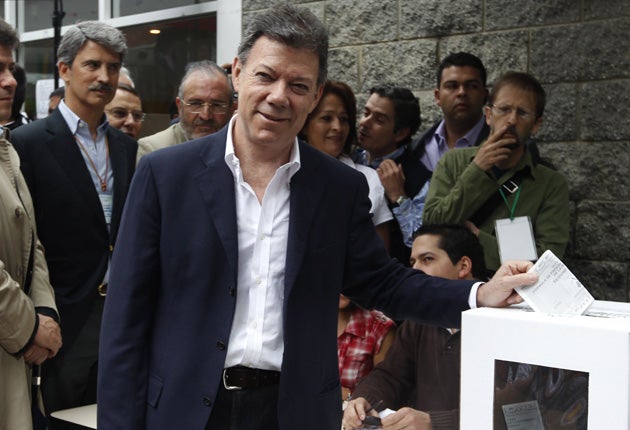Green maverick fades away as Colombia goes to the polls

Boters in Colombia took to the polls yesterday at the end of a presidential campaign that swung from high drama, with the unexpected rise of a fringe green candidate just a few weeks ago, to almost anti-climactic calm as the ruling party favourite seemed poised to cruise to a landslide win.
The only remaining issue appeared to be what margin of victory Juan Manuel Santos, a former defence minister in the government of still-popular President Alvaro Uribe, would achieve.
It will be a disappointing conclusion to the flirtation with power of Antanas Mockus, a former philosophy professor and Mayor of Bogota, who earlier in the campaign had ridden an unexpected popular surge. But while his showing in the first round on 30 May denied Mr Santos the 50 per cent he needed to avoid Sunday's run-off, his 27 per cent score was far lower than expected and his star began to fizzle.
Low turn-out appeared to be the only remaining threat to Mr Santos, with many Colombians opting to watch soccer over voting. "Let's lose a few minutes of World Cup football," Mr Santos said at a campaign rally last week. "Let's score the biggest goal for Colombia."
Helping carry Mr Santos, 58, was the backing of Mr Uribe, who might have sought to remain in the presidential palace but for a ruling from the courts that the country's term-limit laws had to be respected. Mr Uribe will leave office with high popularity ratings, partly because of his success in suppressing, though not eliminating, the feared Farc guerrilla army.
The lowering of violence – terror attacks fell from 1,645 in 2002, when Mr Uribe took office, to 486 last year, while murders and kidnappings fell even more dramatically – is also part of Mr Santos's story. "It's going to be Santos. It seems to me he has the same ideas as Uribe," one voter, Lauriano Luengas, told Reuters at a Bogota polling station. "The country has to keep advancing."
The years under Mr Uribe are widely considered to have helped Colombia even though human rights violations have remained a delicate issue, as has the sometimes glaring gap between the mass of the population and the elite. And despite receiving $600m (£400m) a year in aid from the US to tackle its drugs industry, Colombia still accounts for roughly half of the world's production of cocaine.
What is not likely to improve with the election of Mr Santos are the country's often frayed relations with the leftist governments across its borders in Venezuela and Ecuador. The latter has issued a warrant for his arrest in connection with a raid into Ecuadorian territory in 2008 in search of Farc commanders. Mr Santos has called the arrest order by Ecuador absurd.
Mr Mockus stumbled in part when he wrongly suggested that if Ecuador wanted to arrest Mr Santos as president he would not be able to resist. But for a while, the notion of his possibly winning the race did not seem absurd as he built a platform that stressed improving education for the working population and tackling the whiff of corruption that Mr Uribe has never quite managed to clear from his government.
The contenders
Juan Manuel Santos
The ex-defence minister and self-styled heir to the outgoing President Alvaro Uribe Velez. An economist, journalist and politician, Santos was educated in the US and has held key cabinet positions in three different administrations, though this is his first run for presidential office. He is a prominent member of the powerful Santos dynasty, and is the great-nephew of the former Colombian President Eduardo Santos. Key Santos policies include upholding Uribe's strict security approach to Farc rebels and a vow to help the poor overcome the nation's notorious income inequality.
Antanas Mockus
The son of Lithuanian immigrants and educated in France, he is a prominent mathematician, philosopher and liberal politician who has twice served as the Mayor of Bogota. He is renowned for promoting policies with eccentric PR stunts and once wore spandex and a cape to pose as a 'super-citizen'. Some key policies include an anti-corruption campaign targeted at the Colombian government, and championing the power of education. After two previous attempts, this is his third run for office.
ENJOLI LISTON
Subscribe to Independent Premium to bookmark this article
Want to bookmark your favourite articles and stories to read or reference later? Start your Independent Premium subscription today.

Join our commenting forum
Join thought-provoking conversations, follow other Independent readers and see their replies